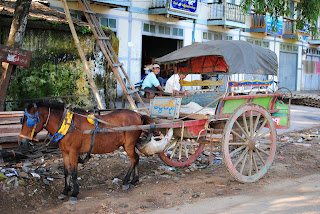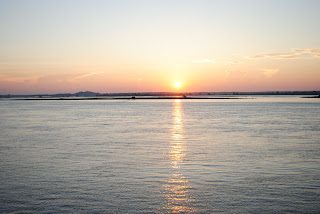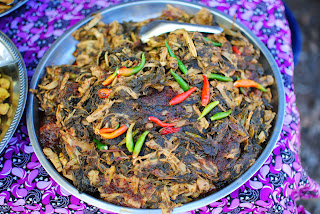Walking the in footsteps of your favorite authors can take you down some interesting tributaries, following in the footsteps of Orwell's book Burmese Days I choose to take a boat. After a missed boat, mix ups with the times I arrived at the Jetty at around 4:45 in the morning. There were two lines one for foreigners and an other for locals. I was reassured that I would not be the only English speaker taking the supposedly 40 hour trip north. I was waived forth by the attendant that I had been pestering for the past couple of days at the jetty. I paid my 9 dollars and started towards the two boats moored side by side. One of these boats was going north to Kata my destination, the other was going to Bagan south along the river my destination later in the trip. I was directed to pass over the first boat to the larger ferry. I boarded and was immediately hit with the scent of concentrated shallot and fermented fish smells. I was guided to a raised wooden platform that was my bed, this was to be my home for the next three and a half days.
In our "handy" guide book which I have since lost they say that this trip should take 40 hours, mine turned into a three day excursion. Be prepared for the unexpected while traveling Burma. One day was lost completely because we were waiting for the spotlight, the only headlight on the boat to navigate at night, to arrive. Countless hours were used up because this boat is the lifeblood of an entire region. The boat collects rice and delivers necessary goods to people who do not have real road access. The trains and ferries make up the life blood of commerce above Mandalay.
Burma is a place where you can still find places that have gone much unchanged for centuries. There is no knowledge of tourism or catering to the backpacker in these areas. You are left to your own devices and must eat and drink what the locals consume. I am sure if I go back to some of these places I will see dramatic changes but right now there is very little in the terms of comfort in this part of the country. As you can see by the pictures, this is a boat out of a different age, more Heart of Darkness than modern ferry. It was really a rusty skeleton of a ship, empty rooms and more cargo than could shake a stick at. They have literally brought the kitchen sink with them. Ramen noodles, piping, steel girders, rice, industrial sized containers of rotting fish (the Burmese answer to fish sauce), farm machinery, vegetable oil, spices, rope, and cheap plastic crap from China filled the hull of this ship. This is a country where pen and paper still matter, all business is conducted on paper, accounts, tickets are dealt with using meticulous hand written notes and ledgers. The accountant aboard the boat spent the entire first day double checking accounts and preparing for the many stops the ship would make. Nothing here was different from 40 years ago.
On account of the Chinese firecrackers the night before I had not gotten a lot of sleep so I settled in on my wooden plank and feel asleep. When I woke at about seven in the morning the mist was still shrouding the shore, and the heat from the infernal sun had not dissipated it yet. When it cleared I saw a land untouched by modern conveniences. Machines were replaced with cow, metal for wood, plastic for wicker. Looking out on either side were pancake flat fields that had been freshly ploughed. Time had stopped north of Mandalay. People live without electricity, their existence dependent on the land.
My boat mates were made up of locals from Villages along the river, who must have been making a very important trip to Mandalay to do something because it is a serious trek to make it there from these small villages that maybe get the boat once a week. This is a country whereas a foreigners you expect stares but when I moved aboard the ferry all of the eye balls on the boat followed my me. I asked the captain and he said it was rare for a foreigner to take this trip north, the last passenger had been 4 months ago. I understand why, most people are trying to cover the most amount of terrain in a given month, taking a wild boat ride that will end up costing you a week of your month long visa is a hard thing to swallow. Plus the North is not full of the famous temples, it is a place to see people living and to be in undisturbed natural terrain.
One of the most fascinating activities was to watch the loading and unloading of the boat. It would take about 50 men hours of walking back and forth on two planks made of really strong wood stretched over the water, creating a dock of about 12 feet to unload and load rice. I will give all the credit in the world to these men who have figured out how to load entire pieces of very heavy machinery on and off boats like these. Ingenuity is a necessity in this part of Burma. Maybe one day each town with have a real dock but for now sturdy pieces of wood and manpower will have to do.
So this daily routine of stopping for long periods of time went on for 3 and half days. I slept on my wooden planks and ate at the local commissary that was cooking with water pulled from the Irrawaddy River. Obviously this did not sit well with my stomach and I found myself running to the bathroom for at least two nights past fermenting fish smells to a bathroom that was medieval. At times I would share a book of pictures of Wisconsin, my home, with the passengers and they would share their sweets. The candy was made up of dried cane sugar or cane sugar mixed with nuts. A really subtle and satisfying sweet when most of the time you were eating salty preserved things on the boat. After my great but trying journey on the river I finally reached my destination, Kata.
Kata is the setting for the marvelous first novel by George Orwell, where he captures colonialism in all its hypocritical glory. The town has changed little since Orwell wrote this book. For a place that is well known on paper by many in the West I was surprised to see nothing to do with the book, no signs to the British Club, or the jail, or other prominent landmarks. Burma is not designed for tourism yet, and Kata is so remote that there are so few that venture this far north. I arrived in the morning and quickly set about with my Orwellian map to retrace the footsteps of Flory and the other characters. The town is small and easily walked on foot, I went towards the jail and to my surprise it was still there, more ominous now with electrified fences, turrets and big signs that said 'don't take photos.'
In Burma you do not know who is police and who is a civilian. While walking towards the jail I met a group of men eating young coconut flesh and in broken English they offered me a slice. While talking I learned that these men were part of the local military stationed across the street from the jail. If these soldiers had not told me about their jobs I would have had no idea they were involved in the military. It also turns out that you cannot leave the village of Kata, access is restricted to the town and not the countryside. After carefully walking past the jail I saw another landmark and went over to take a look. While trying to figure out what this obelisk was an old man approached me and with the best English of the entire trip addressed me. The man was an old pensioner who had retired from the revenue department where he had been an accountant. I explained that I was retracing the footsteps of Flory from the book Burmese Days. The man was really surprised and excited that I was here just for this purpose and invited me into his home for lunch. This stranger was so curious and after seeing the large pile of old English language books he had I understood that this was a literary man who had been stuck in the boonies for a very long time. One of the interesting anecdotes he recounted was that he went to one of the finest preparatory schools in Burma, the same school that an sang su chi attended. After a great lunch of simply cooked chicken and lots of vegetables I entered the very hot afternoon sun and set out to find a shave. I soon found a barber who had certainly not used his straight razor enough to give me a shave. After a very close straight razor shave I was walking out of town when a young man pulled over and offered me a ride. Again I thought nothing off his connections to the military. As we rode a bit further out of the town the young man stopped and said that this was a far as I could go. In the distance on the top of a ridge was a small military compound with barbed wire. Thankfully, he took me back to the center of town on the ride he said that he was also in the army and was on his day off riding around on his motorbike. The military and army are huge here and is obviously a major source of employment in these remote places with few job opportunities. So basically I was either being followed or 'just' happened to run into someone. Every exchange was friendly but also tense in another way where you could tell my presence in the town was uncomfortable.
The last piece of the book that I wanted to see was the British club where so much of the story took place. The building is still standing and has been converted into a government office for the agriculture ministry. Near the club are the tennis courts where Lieutenant Verrall and the apple of Flory's eye, Elizabeth Lackersteen would ballroom dance. To find either of these places I had to ask a bunch of people and then an old man who wanted nothing in return showed me to it. Although the building is still there and I am not sure the ministry really uses it. Instead of it being open, there were cows out front grazing on the grass. Kata is a walk back in time unchanged since Orwell wrote Burmese Days. This is one of those rare experiences where you can really walk in the footsteps of a book and see how the surroundings that the book is based on influenced the story.
 | |
| Scenes from a hundred years ago, but in 2012 |
 | |
| Raw Sugar candy |
 | |
| A hat made up of all of the pop stars in Burma |
 | |
| Many of these people wanted their photos taken it was a great photo opp |
 |
| The leaf used for Betel chewing |










































































